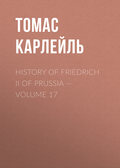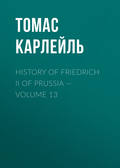
Томас Карлейль
Sacred Books of the East
CHAPTER XXII
THE DOWNWARD COURSE
He who says what is not goes to hell; he also who, having done a thing, says I have not done it. After death both are equal: they are men with evil deeds in the next world.
Many men whose shoulders are covered with the yellow gown are ill-conditioned and unrestrained; such evil-doers by their evil deeds go to hell.
Better it would be to swallow a heated iron ball, like flaring fire, than that a bad unrestrained fellow should live on the charity of the land.
Four things does a reckless man gain who covets his neighbor's wife—demerit, an uncomfortable bed, thirdly, punishment, and lastly, hell.
There is demerit, and the evil way to hell: there is the short pleasure of the frightened in the arms of the frightened, and the king imposes heavy punishment; therefore let no man think of his neighbor's wife.
As a grass-blade, if badly grasped, cuts the arm, badly-practised asceticism leads to hell.
An act carelessly performed, a broken vow, and hesitating obedience to discipline (Brâhma-kariyam), all these bring no great reward.
If anything is to be done, let a man do it, let him attack it vigorously! A careless pilgrim only scatters the dust of his passions more widely.
An evil deed is better left undone, for a man repents of it afterwards; a good deed is better done, for having done it, one does not repent.
Like a well-guarded frontier fort, with defences within and without, so let a man guard himself. Not a moment should escape, for they who allow the right moment to pass, suffer pain when they are in hell.
They who are ashamed of what they ought not to be ashamed of, and are not ashamed of what they ought to be ashamed of, such men, embracing false doctrines, enter the evil path.
They who fear when they ought not to fear, and fear not when they ought to fear, such men, embracing false doctrines, enter the evil path.
They who see sin where there is no sin, and see no sin where there is sin, such men, embracing false doctrines, enter the evil path.
They who see sin where there is sin, and no sin where there is no sin, such men, embracing the true doctrine, enter the good path.
CHAPTER XXIII
THE ELEPHANT
Silently I endured abuse as the elephant in battle endures the arrow sent from the bow: for the world is ill-natured.
They lead a tamed elephant to battle, the king mounts a tamed elephant; the tamed is the best among men, he who silently endures abuse.
Mules are good, if tamed, and noble Sindhu horses, and elephants with large tusks; but he who tames himself is better still.
For with these animals does no man reach the untrodden country (Nirvâna), where a tamed man goes on a tamed animal—on his own well-tamed self.
The elephant called Dhanapâlaka, his temples running with pungent sap, and who is difficult to hold, does not eat a morsel when bound; the elephant longs for the elephant grove.
If a man becomes fat and a great eater, if he is sleepy and rolls himself about, that fool, like a hog fed on grains, is born again and again.
This mind of mine went formerly wandering about as it liked, as it listed, as it pleased; but I shall now hold it in thoroughly, as the rider who holds the hook holds in the furious elephant.
Be not thoughtless, watch your thoughts! Draw yourself out of the evil way, like an elephant sunk in mud.
If a man find a prudent companion who walks with him, is wise, and lives soberly, he may walk with him, overcoming all dangers, happy, but considerate.
If a man find no prudent companion who walks with him, is wise, and lives soberly, let him walk alone, like a king who has left his conquered country behind—like an elephant in the forest.
It is better to live alone: there is no companionship with a fool; let a man walk alone, let him commit no sin, with few wishes, like an elephant in the forest.
If the occasion arises, friends are pleasant; enjoyment is pleasant, whatever be the cause; a good work is pleasant in the hour of death; the giving up of all grief is pleasant.
Pleasant in the world is the state of a mother, pleasant the state of a father, pleasant the state of a Samana, pleasant the state of a Brâhmana.
Pleasant is virtue lasting to old age, pleasant is a faith firmly rooted; pleasant is attainment of intelligence, pleasant is avoiding of sins.
CHAPTER XXIV
THIRST
The thirst of a thoughtless man grows like a creeper; he runs from life to life, like a monkey seeking fruit in the forest.
Whomsoever this fierce poisonous thirst overcomes, in this world, his sufferings increase like the abounding Bîrana grass.
But from him who overcomes this fierce thirst, difficult to be conquered in this world, sufferings fall off, like water-drops from a lotus leaf.
This salutary word I tell you, "Do ye, as many as are here assembled, dig up the root of thirst, as he who wants the sweet-scented Usîra root must dig up the Bîrana grass, that Mâra, the tempter, may not crush you again and again, as the stream crushes the reeds."
As a tree, even though it has been cut down, is firm so long as its root is safe, and grows again, thus, unless the feeders of thirst are destroyed, this pain of life will return again and again.
He whose thirty-six streams are strongly flowing in the channels of pleasure, the waves—his desires which are set on passion—will carry away that misguided man.
The channels run everywhere, the creeper of passion stands sprouting; if you see the creeper springing up, cut its root by means of knowledge.
A creature's pleasures are extravagant and luxurious; given up to pleasure and deriving happiness, men undergo again and again birth and decay.
Beset with lust, men run about like a snared hare; held in fetters and bonds, they undergo pain for a long time, again and again.
Beset with lust, men run about like a snared hare; let therefore the mendicant drive out thirst, by striving after passionlessness for himself.
He who, having got rid of the forest of lust (after having reached Nirvâna), gives himself over to forest-life (to lust), and who, when free from the forest (from lust), runs to the forest (to lust), look at that man! though free, he runs into bondage.
Wise people do not call that a strong fetter which is made of iron, wood, or hemp; passionately strong is the care for precious stones and rings, for sons and a wife.
That fetter wise people call strong which drags down, yields, but is difficult to undo; after having cut this at last, people leave the world, free from cares, and leaving the pleasures of love behind.
Those who are slaves to passions, run down the stream of desires, as a spider runs down the web which he has made himself; when they have cut this, at last, wise people go onwards, free from cares, leaving all pain behind.
Give up what is before, give up what is behind, give up what is between, when thou goest to the other shore of existence; if thy mind is altogether free, thou wilt not again enter into birth and decay.
If a man is tossed about by doubts, full of strong passions, and yearning only for what is delightful, his thirst will grow more and more, and he will indeed make his fetters strong.
If a man delights in quieting doubts, and, always reflecting, dwells on what is not delightful, he certainly will remove, nay, he will cut the fetter of Mâra.
He who has reached the consummation, who does not tremble, who is without thirst and without sin, he has broken all the thorns of life: this will be his last body.
He who is without thirst and without affection, who understands the words and their interpretation, who knows the order of letters (those which are before and which are after), he has received his last body, he is called the great sage, the great man.
"I have conquered all, I know all, in all conditions of life I am free from taint; I have left all, and through the destruction of thirst I am free; having learnt myself, whom should I indicate as my teacher?"
The gift of the law exceeds all gifts; the sweetness of the law exceeds all sweetness; the delight in the law exceeds all delights; the extinction of thirst overcomes all pain.
Riches destroy the foolish, if they look not for the other shore; the foolish by his thirst for riches destroys himself, as if he were destroying others.
The fields are damaged by weeds, mankind is damaged by passion: therefore a gift bestowed on the passionless brings great reward.
The fields are damaged by weeds, mankind is damaged by hatred: therefore a gift bestowed on those who do not hate brings great reward.
The fields are damaged by weeds, mankind is damaged by vanity: therefore a gift bestowed on those who are free from vanity brings great reward.
The fields are damaged by weeds, mankind is damaged by lust: therefore a gift bestowed on those who are free from lust brings great reward.
CHAPTER XXV
THE BHIKSHU
Restraint in the eye is good, good is restraint in the ear, in the nose restraint is good, good is restraint in the tongue.
In the body restraint is good, good is restraint in speech, in thought restraint is good, good is restraint in all things. A Bhikshu, restrained in all things, is freed from all pain.
He who controls his hand, he who controls his feet, he who controls his speech, he who is well controlled, he who delights inwardly, who is collected, who is solitary and content, him they call Bhikshu.
The Bhikshu who controls his mouth, who speaks wisely and calmly, who teaches the meaning and the law, his word is sweet.
He who dwells in the law, delights in the law, meditates on the law, recollects the law: that Bhikshu will never fall away from the true law.
Let him not despise what he has received, nor ever envy others: a mendicant who envies others does not obtain peace of mind.
A Bhikshu who, though he receives little, does not despise what he has received, even the gods will praise him, if his life is pure, and if he is not slothful.
He who never identifies himself with name and form, and does not grieve over what is no more, he indeed is called a Bhikshu.
The Bhikshu who behaves with kindness, who is happy in the doctrine of Buddha, will reach the quiet place (Nirvâna), happiness arising from the cessation of natural inclinations.
O Bhikshu, empty this boat! if emptied, it will go quickly; having cut off passion and hatred, thou wilt go to Nirvâna.
Cut off the five fetters, leave the five, rise above the five. A Bhikshu, who has escaped from the five fetters, he is called Oghatinna—"saved from the flood."
Meditate, O Bhikshu, and be not heedless! Do not direct thy thought to what gives pleasure, that thou mayest not for thy heedlessness have to swallow the iron ball in hell, and that thou mayest not cry out when burning, "This is pain."
Without knowledge there is no meditation, without meditation there is no knowledge: he who has knowledge and meditation is near unto Nirvâna.
A Bhikshu who has entered his empty house, and whose mind is tranquil, feels a more than human delight when he sees the law clearly.
As soon as he has considered the origin and destruction of the elements of the body, he finds happiness and joy which belong to those who know the immortal (Nirvâna).
And this is the beginning here for a wise Bhikshu: watchfulness over the senses, contentedness, restraint under the law; keep noble friends whose life is pure, and who are not slothful.
Let him live in charity, let him be perfect in his duties; then in the fulness of delight he will make an end of suffering.
As the Vassikâ plant sheds its withered flowers, men should shed passion and hatred, O ye Bhikshus!
The Bhikshu whose body and tongue and mind are quieted, who is collected, and has rejected the baits of the world, he is called quiet.
Rouse thyself by thyself, examine thyself by thyself, thus self-protected and attentive wilt thou live happily, O Bhikshu!
For self is the lord of self, self is the refuge of self; therefore curb thyself as the merchant curbs a noble horse.
The Bhikshu, full of delight, who is happy in the doctrine of Buddha will reach the quiet place (Nirvâna), happiness consisting in the cessation of natural inclinations.
He who, even as a young Bhikshu, applies himself to the doctrine of Buddha, brightens up this world, like the moon when free from clouds.
CHAPTER XXVI
THE BRÂHMANA
Stop the stream valiantly, drive away the desires, O Brâhmana! When you have understood the destruction of all that was made, you will understand that which was not made.
If the Brâhmana has reached the other shore in both laws, in restraint and contemplation, all bonds vanish from him who has obtained knowledge.
He for whom there is neither the hither nor the further shore, nor both, him, the fearless and unshackled, I call indeed a Brâhmana.
He who is thoughtful, blameless, settled, dutiful, without passions, and who has attained the highest end, him I call indeed a Brâhmana.
The sun is bright by day, the moon shines by night, the warrior is bright in his armor, the Brâhmana is bright in his meditation; but Buddha, the Awakened, is bright with splendor day and night.
Because a man is rid of evil, therefore he is called Brâhmana; because he walks quietly, therefore he is called Samana; because he has sent away his own impurities, therefore he is called Pravragita (Pabbagita, a pilgrim).
No one should attack a Brâhmana, but no Brâhmana, if attacked, should let himself fly at his aggressor! Woe to him who strikes a Brâhmana, more woe to him who flies at his aggressor!
It advantages a Brâhmana not a little if he holds his mind back from the pleasures of life; the more all wish to injure has vanished, the more all pain will cease.
Him I call indeed a Brâhmana who does not offend by body, word, or thought, and is controlled on these three points.
He from whom he may learn the law, as taught by the Well-awakened (Buddha), him let him worship assiduously, as the Brâhmana worships the sacrificial fire.
A man does not become a Brâhmana by his plaited hair, by his family, or by birth; in whom there is truth and righteousness, he is blessed, he is a Brâhmana.
What is the use of plaited hair, O fool! what of the raiment of goat-skins? Within thee there is ravening, but the outside thou makest clean.
The man who wears dirty raiments, who is emaciated and covered with veins, who meditates alone in the forest, him I call indeed a Brâhmana.
I do not call a man a Brâhmana because of his origin or of his mother. He is indeed arrogant, and he is wealthy: but the poor, who is free from all attachments, him I call indeed a Brâhmana.
Him I call indeed a Brâhmana who, after cutting all fetters, never trembles, is free from bonds and unshackled.
Him I call indeed a Brâhmana who, after cutting the strap and the thong, the rope with all that pertains to it, has destroyed all obstacles, and is awakened.
Him I call indeed a Brâhmana who, though he has committed no offence, endures reproach, stripes, and bonds: who has endurance for his force, and strength for his army.
Him I call indeed a Brâhmana who is free from anger, dutiful, virtuous, without appetites, who is subdued, and has received his last body.
Him I call indeed a Brâhmana who does not cling to sensual pleasures, like water on a lotus leaf, like a mustard seed on the point of a needle.
Him I call indeed a Brâhmana who, even here, knows the end of his own suffering, has put down his burden, and is unshackled.
Him I call indeed a Brâhmana whose knowledge is deep, who possesses wisdom, who knows the right way and the wrong, and has attained the highest end.
Him I call indeed a Brâhmana who keeps aloof both from laymen and from mendicants, who frequents no houses, and has but few desires.
Him I call indeed a Brâhmana who without hurting any creatures, whether feeble or strong, does not kill nor cause slaughter.
Him I call indeed a Brâhmana who is tolerant with the intolerant, mild with the violent, and free from greed among the greedy.
Him I call indeed a Brâhmana from whom anger and hatred, pride and hypocrisy have dropped like a mustard seed from the point of a needle.
Him I call indeed a Brâhmana who utters true speech, instructive and free from harshness, so that he offend no one.
Him I call indeed a Brâhmana who takes nothing in the world that is not given him, be it long or short, small or large, good or bad.
Him I call indeed a Brâhmana who fosters no desires for this world or for the next, has no inclinations, and is unshackled.
Him I call indeed a Brâhmana who has no interests, and when he has understood the truth, does not say How, how? and who has reached the depth of the Immortal.
Him I call indeed a Brâhmana who in this world has risen above both ties, good and evil, who is free from grief, from sin, and from impurity.
Him I call indeed a Brâhmana who is bright like the moon, pure, serene, undisturbed, and in whom all gayety is extinct.
Him I call indeed a Brâhmana who has traversed this miry road, the impassable world, difficult to pass, and its vanity, who has gone through, and reached the other shore, is thoughtful, steadfast, free from doubts, free from attachment, and content.
Him I call indeed a Brâhmana who in this world, having abandoned all desires, travels about without a home, and in whom all concupiscence is extinct.
Him I call indeed a Brâhmana who, having abandoned all longings, travels about without a home, and in whom all covetousness is extinct.
Him I call indeed a Brâhmana who, after leaving all bondage to men, has risen above all bondage to the gods, and is free from all and every bondage.
Him I call indeed a Brâhmana who has left what gives pleasure and what gives pain, who is cold, and free from all germs of renewed life: the hero who has conquered all the worlds.
Him I call indeed a Brâhmana who knows the destruction and the return of beings everywhere, who is free from bondage, welfaring (Sugata), and awakened (Buddha).
Him I call indeed a Brâhmana whose path the gods do not know, nor spirits (Gandharvas), nor men, whose passions are extinct, and who is an Arhat.
Him I call indeed a Brâhmana who calls nothing his own, whether it be before, behind, or between; who is poor, and free from the love of the world.
Him I call indeed a Brâhmana, the manly, the noble, the hero, the great sage, the conqueror, the indifferent, the accomplished, the awakened.
Him I call indeed a Brâhmana who knows his former abodes, who sees heaven and hell, has reached the end of births, is perfect in knowledge, a sage, and whose perfections are all perfect.
THE UPANISHADS
Translation by F. Max Müller
INTRODUCTION
The "Upanishads" are reckoned to be from a hundred and fifty to a hundred and seventy in number. The date of the earliest of them is about B.C. 600; that is an age anterior to the rise of Buddha. They consist of various disquisitions on the nature of man, the Supreme Being, the human soul, and immortality. They are part of Sanscrit Brahmanic literature, and have the authority of revealed, in contradistinction to traditional truth. We see in these books the struggle of the human mind to attain to a knowledge of God and the destiny of man. The result is the formulation of a definite theosophy, in which we find the Brahman in his meditation trusting to the intuitions of his own spirit, the promptings of his own reason, or the combinations of his own fancy, for a revelation of the truth. The result is given us in these wonderful books. We call them wonderful, because the unaided mind of man never attained, in any other literature, to a profounder insight into spiritual things. The Western reader may find in an "Upanishad" many things that seem to him trifling and absurd, many things obscure and apparently meaningless. It is very easy to ridicule this kind of literature. But as a matter of fact these ancient writings well repay study, as the most astounding productions of the human intellect. In them we see the human mind wrestling with the greatest thoughts that had ever yet dawned upon it, and trying to grasp and to measure the mighty vision before which it was humbled to the dust. The seer, in order to communicate to the world the result of his meditations, seems to catch at every symbol and every word hallowed by familiar usage, in order to set out in concrete shape the color and dimensions of mystic verities; he is employing an old language for the expression of new truths; he is putting new wine into old wine-skins, which burst and the wine is spilt; words fail, and the meaning is lost. It is not lost, however, to those who will try to study the "Upanishads" from within, and not from without: who will try to put himself in the attitude of those earnest and patient explorers who brought so much light into the human life of the East, and so much joy and tranquillity to the perturbed spirit of their fellow-men. Those who thus study these ancient writings will find in them the fundamental principles of a definite theology, and, more wonderful still, the beginnings of that which became afterwards known to the Greeks, and has been known ever since, as metaphysics: that is, scientific transcendentalism. This much will be apparent to anyone who will read and study the "Kaushîtaki-Upanishad," which is one of the most wonderful of the religious books of the East. Laying aside the doctrine of metempsychosis and the idea of reincarnation, there is something sublime and inspiring in the imagery with which the destiny of the soul after death is described, while in the metaphysical subtlety of this book we find an argument against materialism which is just as fresh now as when it was first stated.
E.W.







